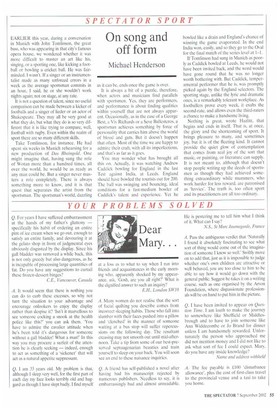On song and off form
Michael Henderson
EARLIER this year, during a conversation in Munich with John Tomlinson, the great bass, who was appearing in that city's famous opera house, we wondered whether it was more difficult to master an art like his, singing, or a sporting one, like kicking a football or bowling a cricket ball. He was fairminded, I wasn't. If a singer or an instrumentalist made as many unforced errors in a week as the average sportsman commits in an hour, I said, he or she wouldn't work nights again; not on stage, at any rate.
It is not a question of talent, since no useful comparison can be made between a kicker of footballs and a singer of lieder or an actor of Shakespeare. They may all be very good at what they do, but what they do is so very different that it is like trying to compare, well, football with rugby. Even within the realm of sport there are so many different skills.
Take Tomlinson, for instance. He had spent six weeks in Munich rehearsing for a new production of Das Rheingold. One might imagine that, having sung the role of Wotan more than a hundred times, all over the world, he would be as ready as any man could be. But a singer never masters a role completely. There is always something more to know, and it is that quest that separates the artist from the sportsman. The sportsman's world, dazzling
as it can be, ends once the game is over.
It is always a bit of a puzzle, therefore, when actors and musicians find parallels with sportsmen. Yes, they are performers, and performance is about finding qualities within yourself that are not always apparent. Occasionally, as in the case of a George Best, a Viv Richards or a Seve Ballesteros, a sportsman achieves something by force of personality that carries him above the world of blood and guts. But it doesn't happen that often. Most of the time we are happy to admire their craft, with all its imperfections, and that's as far as it goes.
You may wonder what has brought all this on. Actually, it was watching Andrew Caddick bowling for England in the last Test against India, at Leeds. England should have bowled the tourists out for 200. The ball was swinging and bouncing, ideal conditions for a fast-medium bowler of Caddick's talent and experience. Yet he bowled like a drain and England's chance of winning the game evaporated. In the end India won, easily, and so they go to the Oval for the final match of the series level at 1-1.
If Tomlinson had sung in Munich as poorly as Caddick bowled at Leeds, he would not have been invited back, and the word would have gone round that he was no longer worth bothering with. But Caddick, temperamental performer that he is, was promptly picked again by the England selectors. The sporting stage, unlike the lyric and dramatic ones, is a remarkably tolerant workplace. As footballers prove every week, it exalts the second-rate, and allows even the third-raters a chance to make a handsome living.
Nothing is great. wrote Hazlitt. that begins and ends in itself. That is, at once, the glory and the shortcoming of sport. It brings pleasure to many, and sometimes joy, but it is of the fleeting kind. It cannot provide the quiet glow of contemplation that comes from real joy of the sort that music, or painting, or literature can supply. It is not meant to, although that doesn't stop people writing up the deeds of sportsmen as though they had achieved something extraordinary while mummers, who work harder for less reward, are patronised as luwies'. The truth is, too often sport and its practitioners are all too ordinary.


























































 Previous page
Previous page